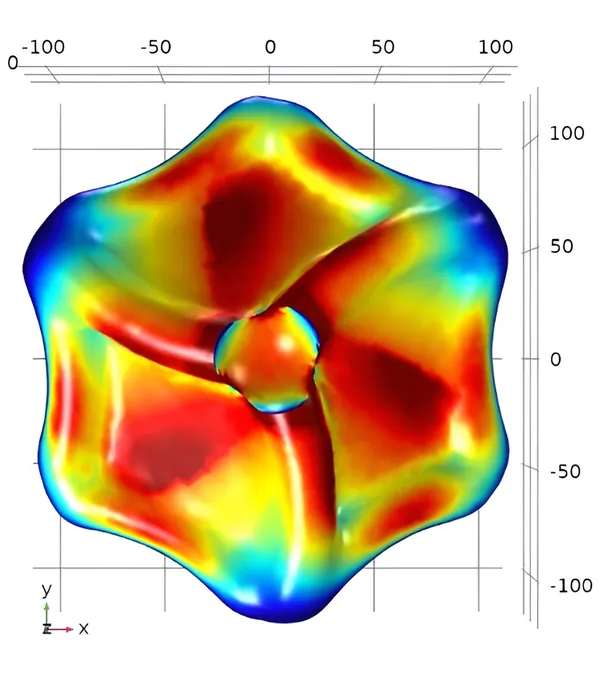
Revolutionary Microchip Transforms Lung Cancer Detection: A Game Changer for Blood Tests!
2024-10-03
Author: Rajesh
Groundbreaking Research Unveiled
Groundbreaking research from the University of Michigan has unveiled a state-of-the-art microchip that promises to revolutionize lung cancer diagnostics, making it not only ten times faster but also 14 times more sensitive than previous techniques. This innovative microchip captures exosomes—microscopic vesicles released from cells—directly from blood plasma, allowing for early detection of lung cancer signs with remarkable accuracy.
The Vital Role of Exosomes
For years, exosomes were dismissed as mere cellular waste expelled to cleanse the body. However, recent discoveries have illuminated their vital role in cellular communication. These tiny packages are rich in proteins and nucleic acids, serving as messengers that can indicate the presence of cancer. While exosomes from healthy cells help maintain bodily functions, those released by cancerous cells can manipulate surrounding tissues, preparing them for tumor invasion. According to Sunitha Nagrath, a leading researcher and professor of chemical and biomedical engineering at U-M, “Cancer exosomes leave the tumor microenvironment and prepare the soil for cancer cells to take root and flourish.”
Detecting Cancerous Exosomes
What’s remarkable is that the proteins found on the surface of cancerous exosomes often undergo mutations that modify their structure, altering their interaction with polarized light. This change is critical because it allows researchers to employ advanced light detection techniques to differentiate between healthy and cancerous exosomes. The challenge, however, lies in the extraction of these tiny exosomes—measuring just 30 to 200 nanometers—from blood samples, which can be a complex task.
Innovative Chip Design
To tackle this issue, the research team ingeniously designed a gold nanoparticle integrated with a twisted disk structure that captures exosomes effectively. When the right-handed light hits these nanoparticles, it resonates strongly, creating clearer signals that can be detected. The unique feature of this system, known as circular dichroism, enables it to respond selectively to the twist of incoming light, providing an unprecedented level of sensitivity in identifying exosomes related to lung cancer.
Clinical Implications of CDEXO
The new microfluidic chip, named CDEXO (Circular Dichroism detection of EXOsomes), is expected to make significant strides in clinical settings. It has the potential to help doctors identify specific lung cancer mutations, paving the way for personalized treatment strategies tailored to target the most prevalent mutations as they evolve.
A Future of Early Detection
Imagine a future where lung cancer can be diagnosed from a simple blood draw, streamlining the process significantly compared to traditional biopsy techniques. Initially, the CDEXO chip is set to be used alongside existing diagnostic methods to build trust in its efficacy, but researchers are optimistic that it can expand its application to other forms of cancer as well.
Looking Ahead: Ambitious Goals
Looking ahead, the research team aims to explore various solid tumor mutated proteins to differentiate their spectral signatures further. Sunitha Nagrath shares their ambitious vision: “Our goal is to enhance the spectral differences, increasing our capability to distinguish between various types of cancer with precision.”
A Vital Breakthrough?
As this innovative technology progresses, it could represent a vital breakthrough in the fight against cancer, offering hope for earlier detection and ultimately saving lives. Are we on the brink of a cancer detection revolution? The implications of this research extend far beyond lung cancer, and the world will be watching with bated breath!

 Brasil (PT)
Brasil (PT)
 Canada (EN)
Canada (EN)
 Chile (ES)
Chile (ES)
 España (ES)
España (ES)
 France (FR)
France (FR)
 Hong Kong (EN)
Hong Kong (EN)
 Italia (IT)
Italia (IT)
 日本 (JA)
日本 (JA)
 Magyarország (HU)
Magyarország (HU)
 Norge (NO)
Norge (NO)
 Polska (PL)
Polska (PL)
 Schweiz (DE)
Schweiz (DE)
 Singapore (EN)
Singapore (EN)
 Sverige (SV)
Sverige (SV)
 Suomi (FI)
Suomi (FI)
 Türkiye (TR)
Türkiye (TR)